|
|
|
Sort Order |
|
|
|
Items / Page
|
|
|
|
|
|
|
| Srl | Item |
| 1 |
ID:
166767
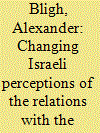

|
|
|
|
|
| Summary/Abstract |
Since 1948/1949 The International Committee of the Red Cross (ICRC) has been synonymous in the Arab–Israeli context with processes of exchanging prisoners and caring for human lives. After the 1967 war the ICRC changed in status from that of a mediator to that of the executive arm of larger forces. The processes leading to the partial demise of the ICRC are clearly identified in retrospect. It has to do with the asymmetry of perceptions between Israel and the organisation. Israel did not agree to the application of the Fourth Convention in the territories. The ICRC believed that this population fell under the Convention and therefore under the ICRC. Furthermore, the ICRC failed in getting the Israeli POWs back home, especially after the conclusion of the War of Attrition in 1970. The resulting feelings eliminated in the Israeli decision makers' minds the role that the ICRC saw for itself in future POW exchange deals. After the 1973 war the ICRC would lose its position as a negotiator, leaving that arena to other international actors.
|
|
|
|
|
|
|
|
|
|
|
|
|
|
|
|
| 2 |
ID:
166772
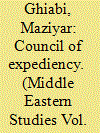

|
|
|
|
|
| Summary/Abstract |
Giorgio Agamben argues that in contemporary governance the use of ‘emergency’ is no longer provisional, but ‘constitutes a permanent technology of government’ and has produced the extrajudicial notion of crisis. The engendering of ‘zones of indistinction’ between the law and its practice is what Agamben defines as a ‘state of exception’. This article adopts the notion enunciated by Agamben and revisits it in the Islamic Republic of Iran. There, the category of crisis has been given, firstly, a juridical status through the institution of maslahat, ‘expediency’, interpreted in a secular encounter between Shica theological exegesis and modern statecraft. Secondly, crisis has not led to the production of a ‘state of exception’ as Agamben argues. Instead, since the late 1980s, a sui generis institution, the Expediency Council, has presided and decided over matters of crisis. Instead of leaving blind spots in the production of legislative power, the Expediency Council takes charge of those spheres of ambiguity where the ‘normal’ – and normative – means of the law would have otherwise failed to deliver. This is a first study of this peculiar institution, which invites further engagement with political phenomena through the deconstruction and theorization of crisis politics.
|
|
|
|
|
|
|
|
|
|
|
|
|
|
|
|
| 3 |
ID:
166771
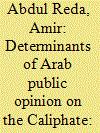

|
|
|
|
|
| Summary/Abstract |
What are the determinants of public opinion on the issue of the Caliphate in the Arab world? My answer to this question outlines the key role played by Islamist elites, religiosity and age in influencing Arab opinion on the issue of the Caliphate in three countries during the early Age of Islamism (1980s–1990s). I do so by using Binary Logistic Regression Models on observations that I found in survey data collected in 1988 in Egypt and Kuwait, and an Ordinal Logistic Regression Model for data collected in Palestine in 1995. My results suggest that elites play a key role in spreading Islamist ideas in Egypt and Palestine, while age and religiosity are most salient in Kuwait.
|
|
|
|
|
|
|
|
|
|
|
|
|
|
|
|
| 4 |
ID:
166769
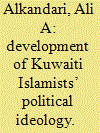

|
|
|
|
|
| Summary/Abstract |
This article aims to explore how the intellectual thinking and political actions of an Islamist could be developed and changed toward a more realistic view. The Kuwaiti Islamic Students’ movement in the UK was led by the youth of the Muslim Brotherhood under the Free Kuwait Campaign during the Second Gulf Crisis in 1990-91. This movement went through a significant development and change of ideas and practices with other political and societal groups. Dealing with all segments of Kuwait’s society as partners in the country and its destiny, and not as intellectual or party opponents, was the main change in ideas. Moreover, a qualitative leap in realistic political thought emerged among these young people and affected the future of the movement. In the immediate post-invasion era, this action was not invested towards building an open national platform. However, the students’ actions were influenced by the event, and pro Islam al-’i’tilafiyah became more accepting of others, leading to many students from other ideologies joining the ranks. Moreover, nationalistic ideas crept into Islamic thoughts in the post-invasion era, leading to a mixture of ideologies rendering one ‘moderate’ or ‘conservative’ that was described by stricter Islamists as ‘lenient’.
|
|
|
|
|
|
|
|
|
|
|
|
|
|
|
|
| 5 |
ID:
166766
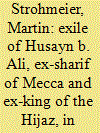

|
|
|
|
|
| Summary/Abstract |
This article deals with the exile of Husayn ibn Ali, ex-sharif of Mecca and ex-king of the Hijaz, in Cyprus (1925–1930). It was not politics, but the adversities of everyday life that shaped the ex-king’s stay in the British colony. Loss of prestige, estrangement, uncertainty about the future, lawsuits, financial problems and the death of his wife contributed to failing health which ultimately led to his relocation to Amman. A special, perhaps unique feature of Husayn’s enforced residence in the island is that the power which exiled him also granted him asylum. This article examines his living conditions, experience with and image in the local community, relations with his sons as well as his dealings with British authorities. In this way the progressive isolation and marginalization of an ex-monarch in exile becomes evident.
|
|
|
|
|
|
|
|
|
|
|
|
|
|
|
|
| 6 |
ID:
166770


|
|
|
|
|
| Summary/Abstract |
In the early morning of 3 August 2014, Islamic State of Iraq and Syria (ISIS) attacked the Sinjar district in the vicinity of Mosul. The area was largely under the control of Kurdish forces at the time, especially those associated with the Kurdistan Democratic Party (KDP). Those forces could not defend the district and ISIS was able to take control of the area. Consequently, a considerable number of Yazidi people were killed or displaced, while female Yazidis were raped and kidnapped. This study, based on framing theory, attempts to explain how two major Kurdish media organizations, Rudaw, which is loyal to KDP, and the Kurdish News Network (KNN), which is loyal to the Gorran (Change) Movement, each covered the event in their news reports. By performing a content analysis of 222 news stories covering the event, the key finding of the research is that, in instances of assigning responsibility for the fall of Sinjar, political considerations are the determining factor in how the narrative was framed. Taken as part of a growing literature on media in Kurdistan, the research outlined in this article supports the conclusion that the framing of media coverage in the Kurdistan Region is subject to strong political bias and media organizations support the political narratives advanced by their political patrons, as it is the case in many other Middle Eastern countries.
|
|
|
|
|
|
|
|
|
|
|
|
|
|
|
|
| 7 |
ID:
166763
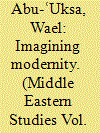

|
|
|
|
|
| Summary/Abstract |
This article employs the methodology of conceptual history to contest two of the most common theoretical approaches dominating our understanding of modernity in the field of Middle Eastern studies. The first approach relies on the assumption of incompatibility between modernity and Islam and captures Arab modernity using concepts such as ‘adoption’. The second understands Arab modernity through concepts such as ‘imitation’, contending that it is a legacy of Western imperialism. This article challenges both theories by examining the genealogy of tamaddun (civilization, being civilized), a pivotal concept used in nineteenth-century Arabic to imagine modernity. The genealogy of tamaddun elucidates that medieval paradigms derived from the concept of madina (polity) were rediscovered, reimagined, and reused in the context of the rise of the nation-state and the challenge of Western imperialism. The article suggests understanding Arab modernity and its critique from within, rather than outside of, the temporality of the historical condition.
|
|
|
|
|
|
|
|
|
|
|
|
|
|
|
|
| 8 |
ID:
166768
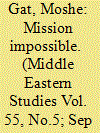

|
|
|
|
|
| Summary/Abstract |
Since entering office, William Rogers had undertaken to advance the peace process between Israel and the Arab states, particularly Egypt. He believed an agreement would serve the American interests at a time when extremism was spreading in the Arab world, and Soviet influence had grown. However, his actions on the political front went unsupported by President Nixon. Moreover, the National Security Advisor had embraced a different policy vis à vis Israel and the Arab world. Rogers' failure to secure an interim agreement and his previous failure to persuade Israel and Egypt to accept his plan, led the entire region back to stagnation, from which it emerged only after the October 1973 Yom Kippur War.
|
|
|
|
|
|
|
|
|
|
|
|
|
|
|
|
| 9 |
ID:
166764
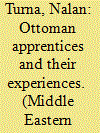

|
|
|
|
|
| Summary/Abstract |
In this article, I analyze craft and trade apprentices in the late Ottoman Empire in order to add a new dimension to the existing literature on guilds and artisans. Rather than presenting an ideal picture, I discuss the apprentices' actions and experiences, which I argue did not take place in isolation.
First, I briefly discuss Ottoman guilds and artisans, including a literature review, define and explain both the system of apprenticeship and who apprentices were.
|
|
|
|
|
|
|
|
|
|
|
|
|
|
|
|
| 10 |
ID:
166765
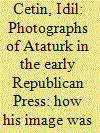

|
|
|
|
|
| Summary/Abstract |
Since its invention, photography has been seen as representing reality as it was, as a result of which an evidential quality has been attributed to it. This quality comes more to the fore in certain contexts, one of them being press photography. Photographs in a newspaper are meant to testify to the event described in the news. This article looks at the photographs of Mustafa Kemal Ataturk, the founder of the Turkish Republic, which were circulated in the early Republican Press. Many photographs of Ataturk which were published in the periodicals at that time did not testify to the actualization of an event and henceforth did not provide any evidence for the events. They nevertheless have an evidential quality, which they acquire not from what they show, but from what they signify.
|
|
|
|
|
|
|
|
|
|
|
|
|
|
|
|
|
|
|
|
|